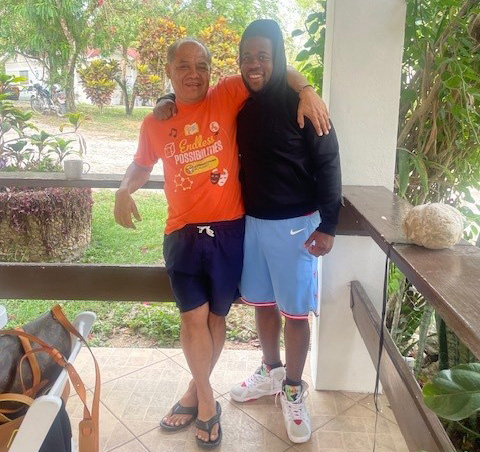During my junior year at North Carolina Agricultural & Technical State University, I spent 9 days studying abroad in Belize as an undergraduate intern in speech-language pathology at Frank’s Eddy Government Primary School and San Oscar Romero Catholic School. There, I observed and worked with children ages 5–14 with diagnoses such as autism and developmental disability, and speech-language impairments. I provided support to the students and worked in collaboration with the classroom teacher during activities related to literacy, phonemic, and phonological awareness. I also created literacy materials that enhanced student instruction.
This experience taught me that Belizeans appreciate their own culture; they find joy in the simplicity of life and being genuinely happy. Nature, natural resources, and their cultural traditions are deeply rooted in who they are as people. As you engage in a study-abroad experience, allow yourself opportunities to enjoy the cultural richness. There is much to learn from being culturally responsive and increasing your own cultural competency—both personally and professionally.
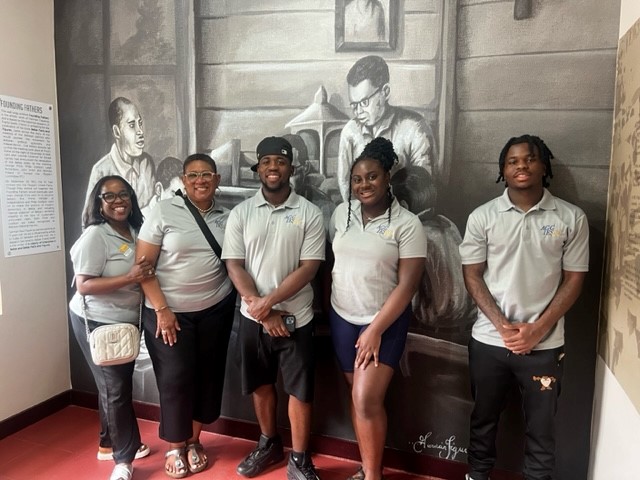
Derron, pictured third from left, and his travel toured a museum dedicated to Belizean freedom fighter Philip Goldson.
The Project SHARE Program—and Belize
Project SHARE—which stands for Speech, Language, and Hearing Reaching Everyone—is a program offered by my university’s Department of Communication Sciences and Disorders. It was created by my mother and Department Chair Dr. Deana McQuitty, who also serves as the faculty lead, with a guided, international co-curriculum offered by Toucan Education Programs. The program’s purpose is to increase or enhance our cultural competencies, help us apply critical thinking and problem solving in an international setting, and give us a competitive edge to pursue graduate-level studies.
Belize provided a high-quality cultural and global experience that allowed me and my fellow exchange students to gain additional exposure to culturally and linguistically diverse communities. Moreover, with Belize having limited resources in terms of expansion of special education programming, this program provides an excellent opportunity for us undergraduates to take our speech and language academic knowledge and apply it to the clinic, enabling a broader application within the global society. My fellow classmates and I were able to provide the schools with additional literacy resources and strategies to assist with classroom effectiveness.
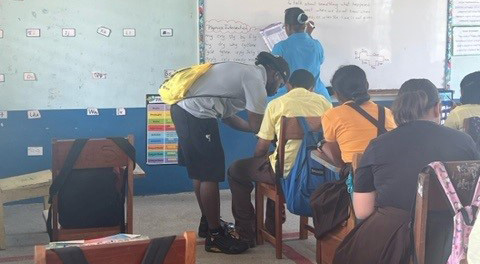
A Typical Day in Belize
A typical day began with our arrival at the designated primary school around 9:15 a.m. Then, we were paired with students that the classroom teacher and principal identified as needing additional support. On the first day, we observed the classroom infrastructure, including classroom management and the academic curriculum as well as class transitions. I feel that when you are working with students, observing them helps build some rapport and trust. In the subsequent days, we sat alongside students, assisted with their class literacy activities, and on the last day, we conducted a class literacy lesson.
Two Different Education Systems
What struck me the most about the education system and speech-language pathology services in Belize compared to those in the United States would have to be the equity challenges related to service access and educational resources. In the United States, students are equipped to attend public and private schools that afford them with opportunities to be exposed to top-of-the-line technology and educational materials.
When I first stepped foot into the schools in Belize, it was a culture shock for me in terms of the limited resources they had. One of the classroom teachers informed me that they just recently received Wi-Fi (yes . . . in 2023)! In the United States, we are accustomed to seeing every student with a Chromebook in the classrooms. In Belize, teachers were lucky to have one functioning tablet that could be shared with all 20 students in each class.
In addition to limited technology and resources, access to skilled speech-language pathologists (SLPs) on a consistent basis was also a challenge. The classroom teachers did share that SLPs come into the main parts of Belize City, and students must be transported to the city to receive services. However, in the small villages where I completed my study-abroad experience, these students may go months and months without receiving any specially designed services. In fact, several of the classroom teachers were disheartened to learn that we were only going to be there for a week. They were thirsty for knowledge and appreciated the literacy activities and support that we provided within their classrooms.
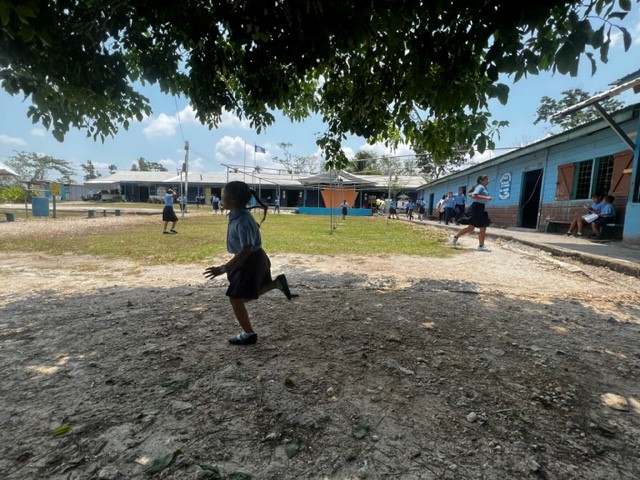
Life in the Village
We started our study-abroad experience in Hopkins, Belize, then traveled to San Ignacio, and our final destination was Belmopan. I participated in excursions, engaged with nightlife, interacted with local Belizeans, and observed church services. I can remember one of the evenings in Hopkins, I was able to go to the basketball court where vendors were displaying some of their handmade goods. It was amazing to walk down the streets in the village and see wild dogs (who were quite friendly) relying on people to feed them. All in all, village life showed me two main things:
1) How much the people supported one another.
For example, the person selling fruit may exchange fruit for a clothing item and vice versa. The people in Hopkins used natural resources and people around them in order to survive because they lived 2 hours from the main city.
2) People are people no matter where you visit in life.
I was able to play basketball with some of the locals, and they know about American celebrities like LeBron James. I also saw people wearing Jordan sneakers and listening to some of the same music that I listen to in the United States. This experience created a sense of community for me. They were also extremely friendly and receptive to us. I was able to learn the community rules of the village and how to conduct myself as an international traveler. I appreciated that insight; it assisted my ability to navigate effectively throughout the study-abroad experience.
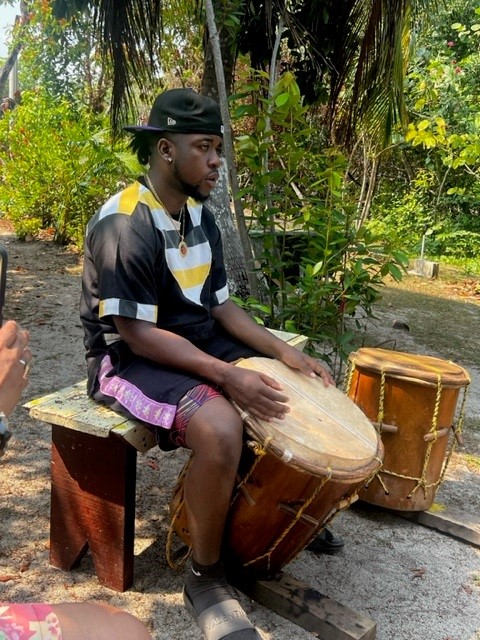
Advice for CSD Students Who Are Interested in Studying Abroad
I offer three pieces of advice for CSD students who are interested in studying abroad:
1) If you get the chance—go.
Talk to your chapter advisor or to a professor who can connect you to the campus department that runs study-abroad programs. As a CSD undergraduate, I found that having this opportunity was invaluable. In traditional study-abroad programs, most clinical hands-on experiences are provided only during graduate education. In a field where being culturally responsive is imperative, study-abroad opportunities extend their lens beyond that of most pre-professional students. Global speech-language pathology has allowed me the opportunity to more deeply appreciate the critical need that still exists within this profession.
2) Be safe.
Navigating study-abroad experiences is best and safest to explore through your cohort. The program offered through North Carolina Agricultural & Technical State University and Toucan Education Programs provided a tour guide who was assigned to our student group for the entire length of our study-abroad program.
Another thing to remember:
3) Be open-minded.
As future SLPs, be open to learning about all cultures and how we can be equitable in our treatment of patients and in our provision of evidence-based services. We must recognize that other cultures around the world learn from us, and we can learn from them, as well. We can learn an appreciation for making the best out of “simplicity” but at the same time contributing to effective services.
This experience really has made me think of the model I want to have for my future private practice. Belize taught me a valuable lesson in that there is more than one way of achieving a goal. I will always make sure that the client’s personality thrives—because I view the SLP’s role as similar to that of a coach: You have to work with a team of people to accomplish a common goal—to ensure you’re your clients experience successful progression and achieve their outcomes. To do that, the patient needs to be heard and seen.
Working with culturally and linguistically diverse populations has enlightened me and made me pay close attention to the unique insights that are critical for these populations, especially during assessments and interventions. For those interested in studying abroad or working abroad, it is essential to value and use culturally responsive practices and build interpersonal rapport with clients—doing so will allow for growth not only for your clients but for yourself.
Featured Photo: Derron is pictured with his group’s tour guide, Ted, a Belizean with whom Derron bonded during his time abroad.

